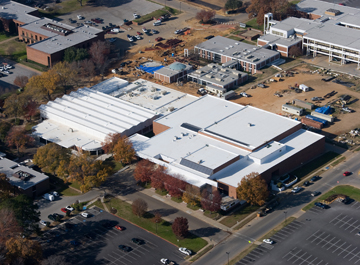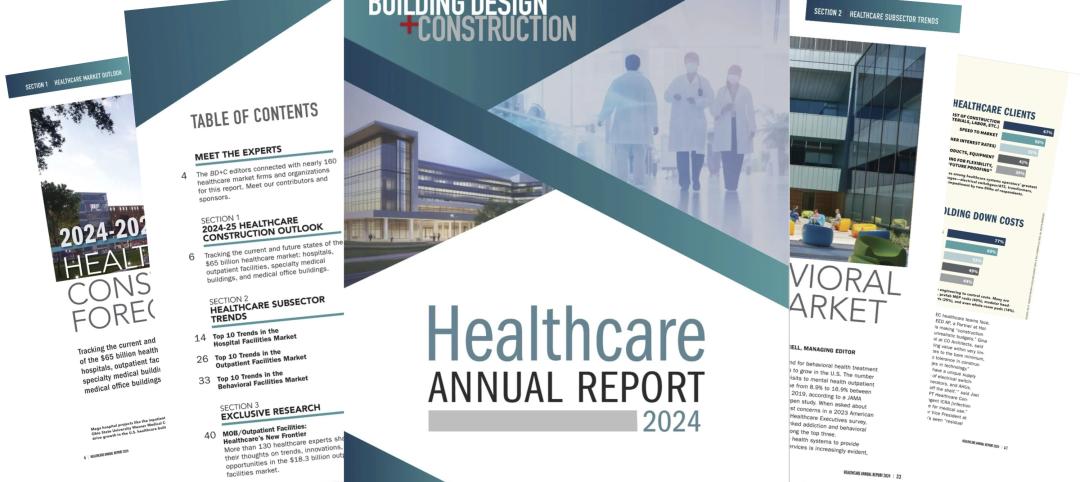The official colors of Tyler Junior College in Tyler, Texas, might be black and athletic gold, but when it comes to campus building roofs, the school prefers to see “white and green.” White, for the color of the Sika Sarnafil EnergySmart Roof® membrane, and “green” for the roof’s energy savings and environmental benefits.
“Tyler Junior College is one of the largest junior colleges in the nation, and our new college president, Dr. L. Michael Metke, wanted to make the campus ‘greener’ and shrink our ecological footprint,” explained Kevin Jones, assistant director of Facilities and Construction at Tyler Junior College. “So when we looked to replace some of the failing roofs at the college, we wanted to find a roofing system that was sustainable and good for the environment.”
Jones did some research on the Internet and found one product that would meet this criterion was the Sika Sarnafil roofing system. Unlike the dark-colored modified bitumen, ballasted EPDM, and BUR roofs previously installed on the college buildings, the EnergySmart Roof reflects 83% of the sun’s rays, thereby keeping the building cooler and reducing air conditioning costs. With an emissivity rating of 90%, the small amount of heat that is not reflected is quickly released back to the atmosphere.
“Our administration also liked the fact that the Sika Sarnafil roofing membranes can be recycled at the end of their useful lives,” Jones said. In fact, Sika Sarnafil recently became the first roofing manufacturer to receive UL recycled content certification.
Although Jones was impressed with the environmental benefits of the Sika Sarnafil membrane, he wanted to be sure that the roofing system would also perform well.
“I read that the Sika Sarnafil membrane was used on the new Dallas Cowboys stadium, so I contacted a Sika Sarnafil representative to learn more,” Jones said. “Not only did he give me a tour of the Cowboys stadium but he also showed me a 30-year-old Sika Sarnafil roof at a Southwest Foods warehouse and manufacturing facility here in Tyler — and that roof looked like it was only 10 years old. That’s when we decided to go with the Sika Sarnafil system.”
The Vaughn Library received the first Sika Sarnafil roof at the junior college in 2010, and the Wagstaff Gym was next. The school has been very pleased with their experience with Sika Sarnafil. Subsequently, Sarnafil® roofs were chosen for the campus Information Technology Building, the Genecov Science Building, and for the college’s Hudnall Planetarium.
“We wanted a roofing system that wouldn’t need any attention for a long time, and to date we have never had a single call or issue with any of the Sika Sarnafil roofs,” Jones said. “In fact, our goal is to install Sika Sarnafil roofing systems on all of our flat roofs.”
He added, “Sometimes following a green initiative is not economically feasible, but that’s not the case with the Sika Sarnafil roofs. They have a durable, long-lasting, energy efficient product backed up by a worldwide company.” BD+C
Related Stories
Codes and Standards | Jul 15, 2024
New York City code update changes definition of a major building
Changes affecting how construction projects in New York City are permitted will have significant impacts for contractors. On Dec. 11, the definition of a major building in the city’s code will change from 10 stories to seven, or 75 feet. The change will affect thousands more projects.
Adaptive Reuse | Jul 12, 2024
Detroit’s Michigan Central Station, centerpiece of innovation hub, opens
The recently opened Michigan Central Station in Detroit is the centerpiece of a 30-acre technology and cultural hub that will include development of urban transportation solutions. The six-year adaptive reuse project of the 640,000 sf historic station, created by the same architect as New York’s Grand Central Station, is the latest sign of a reinvigorating Detroit.
University Buildings | Jul 11, 2024
3 considerations for designing healthy, adaptable student dining
Amanda Vigneau, IIDA, NCDIQ, LEED ID+C, Director, Shepley Bulfinch, shares three ways student dining facilities have evolved to match changes in student life.
Healthcare Facilities | Jul 11, 2024
New download: BD+C's 2024 Healthcare Annual Report
Welcome to Building Design+Construction’s 2024 Healthcare Annual Report. This free 66-page special report is our first-ever “state of the state” update on the $65 billion healthcare construction sector.
Transit Facilities | Jul 10, 2024
Historic Fresno train depot to be renovated for California high speed rail station project
A long-shuttered rail station in Fresno, Calif., will be renovated to serve as the city’s high speed rail (HSR) station as part of the California High-Speed Rail Authority system, the nation’s first high speed rail project. California’s HSR system will eventually link more than 800 miles of rail, served by up to 24 stations.
Government Buildings | Jul 8, 2024
GSA adopts new accessibility guidelines for federal properties
The U.S. General Services Administration (GSA) adopted a new rule with new accessibility guidelines for federal buildings. The rule establishes that pedestrian facilities in the public right-of-way are readily accessible to and usable by people with disabilities.
Office Buildings | Jul 8, 2024
Office vacancy peak of 22% to 28% forecasted for 2026
The work from home trend will continue to put pressure on the office real estate market, with peak vacancy of between 22% and 28% in 2026, according to a forecast by Moody’s.
Virtual Reality | Jul 8, 2024
Can a VR-enabled AEC firm transform your project?
With the aid of virtual reality and three-dimensional visualization technologies, designers, consultants, and their clients can envision a place as though the project were in a later stage.
Green | Jul 8, 2024
Global green building alliance releases guide for $35 trillion investment to achieve net zero, meet global energy transition goals
The international alliance of UK-based Building Research Establishment (BRE), the Green Building Council of Australia (GBCA), the Singapore Green Building Council (SGBC), the U.S. Green Building Council (USGBC), and the Alliance HQE-GBC France developed the guide, Financing Transformation: A Guide to Green Building for Green Bonds and Green Loans, to strengthen global cooperation between the finance and real estate sectors.
Codes and Standards | Jul 8, 2024
New York State building code update would ban fossil fuels in new buildings
New York’s Building Code Council is set to include the All-Electric Buildings Act in its 2025 code update. The Act would ban natural gas and other fossil fuels in new buildings.

















